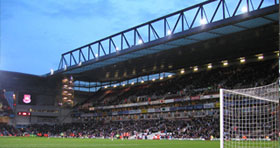|
We went, like tens of thousands of others, to watch what should have been the match of a lifetime: Kenny Dalglish and Ian Rush’s Liverpool against Gaetano Scirea and Michel Platini’s Juventus, for the European Cup of 1985. My friend Patrick Wintour (now political editor of this newspaper, whom I had known since the age of eight) and I had made a habit of treating ourselves to European Cup finals – this would be our last. We walked across the Brussels Grand Place, laid with a carpet of broken beer bottles, and up to the stadium with the English, waddling and bellowing, drunk on lager and the xenophobia of the day.
Advertisement
We took our seats in time to see the last, fatal charge by these same Liverpool fans into a pen of Italian supporters beneath us: the panic, the flight, the crush, the thud like explosives at a distant quarry as a wall collapsed.
We saw the row of dead bodies and the whooping – I especially recall the Liverpool fans’ whooping. The irony is too cruel: four years later, Liverpool fans themselves suffered carnage similar to that wrought at the Heysel stadium in Belgium on the murderous night of 29 May 1985. After decades of tenacious campaigning for justice, we approach a reckoning over Hillsborough; finally, the bereaved relatives have what comfort they can find in a culpability admitted by South Yorkshire police. But as the 30th anniversary of Heysel falls on Friday and a commemorative mass is held in Turin for the dead, Heysel, un-reckoned, remains football’s forgotten crime – despite its 39 dead and more than 600 injured. The fact that Juventus play next weekend in the European Cup final deepens the painful poignancy of the moment.
Advertisement
We had landed on a Wednesday from London, at Ostend-Bruges airport, for transfer to Brussels by bus. So too had Bruno Guarini and his son Alberto, from the town of Mesagne in Puglia, in Italy’s heel; they had flown from Brindisi and the trip was a congratulatory gift for Alberto who had recently passed his dentistry exams. “Of course Alberto knew Liverpool,” Guarini would later say to me. “They were famous, a wonderful team and we thought the fans would be like us, just crazy about football.”
When father and son arrived at the stadium, recalls Guarini, “the English had their shirts off, lying on the grass with their beer, so we went straight inside. Alberto had his Juventus bag to carry his binoculars and his packed lunch. The hooligans were at the other entrance, drinking and shouting. I said to Alberto, ‘we’ll go away from them – they might throw things.’ So we went towards the wall at the side. It was the worst thing I ever did, because those near the English were the ones who survived.”
Meanwhile, already inside, we watched Liverpool fans crash through the fence feebly separating them from the Juventus fans, across the terracing into fleeing Italians, with disbelief. But Guarini was right: the signs had been there all day, as the British fans got drunk and rowdy on their way to the ground. In fact, they had been there for years: Britain was on patriotic turbo-charge after the election of Margaret Thatcher and war in the Falklands, and no one expressed the mood with greater articulacy than “our boys” supporting football teams in Europe. There had already been serious trouble with Spurs and Manchester United; now it was Liverpool’s turn.
“They came running at us through the fence,” recalls Guarini. “Alberto was caught against a barrier. His last words were ‘Papa, mi stanno schiaccando’ – Daddy, they’re crushing me”. Guarini lost consciousness, but when he came to he insisted that the Red Cross join him to search for his son. They found him, lifeless.
While paramedics counted the dead, the game was played, despite protests from some players on both sides – Uefa calculating that to cancel it would lead to further violence – and won at around midnight by Juventus. Platini stripped off his shirt and hoisted the cup.
I was a researcher on Granada TV’s World in Action at the time, but Patrick and I wrote a piece for this newspaper – my first. In it, we quoted two Liverpool fans, one back at our hotel who, learning of the dead, said: “Good. They deserved it.” And another at the airport: “I’ve been watching Liverpool for 25 years, now I’m through. I saw people kicking the bodies. There were bodies piled 10 deep and they were booting them. If that’s football, I’m through with it.” I think we felt the same as we trudged home.
The atmosphere back in England was astonishing, though in retrospect to be expected, and I doubt it would be any different now: an orgy of denial, excuses, and a search for rotten apples in an otherwise healthy sport and proud nation. Without doubt, Uefa’s choice of a crumbling stadium was woeful, as was its releasing a third of the tickets at the Liverpool end for “neutral” football fans to buy in Belgium. They were snapped up by tour operators who then sold them to Juventus fans, mostly families, across central and southern Italy (the club’s Ultras were at the other, far, end and played no part in the horror). Security and policing were non-existent.
These circumstances laid the ground for Britain’s collective reaction. Of course, some headlines chastised the “mindless minority”, but they topped the same rags that had – along with prime minister Margaret Thatcher who spoke of her “shame” – stoked the frenzy in the first place: “Hop Off You Frogs” in the Sun was a case in point (with its copious echoes today), along with the same paper’s famous war-cry of “GOTCHA”, three years earlier.
Some insisted the Liverpool fans had been provoked (never substantiated); Liverpool chairman John Smith dismissed the killers as belonging to the National Front in London; “It was the NF, proof page 3”, reported the Daily Star. The Telegraph carried a front page story about “English and Italian fans” being killed in “a riot”. The Express turned quickly to an “anti-British frenzy in Europe” and the Mirror stated: “Britons Warned: Keep out of Europe”.
When Liverpool manager Joe Fagan offered up a prayer in the city’s Anglican cathedral, it was for “all” victims of soccer “tragedies” – natural disasters like earthquakes – “especially Brussels and Bradford”. For an initial church service in Turin, neither Liverpool nor the British embassy managed a wreath. Fans blamed the police, or the ground, or said the slaughter was in retaliation for attacks by supporters of Roma after Liverpool had won the previous year’s cup in Rome. No reckoning; Heysel remained an open wound.
This went on for 20 years, if Heysel was mentioned at all. A few perpetrators were identified and extradited to Brussels – tabloids complained they were deprived of English tea while detained – and had served their short sentences by the time of trial. Even Juventus paid less heed that it should have, for all the efforts of their Ultras and a remarkable organisation of victims’ families set up by Otello Lorentini, whose son Roberto – a doctor – was killed while trying to administer first aid to dying Juventus fans. He was posthumously awarded a silver medal of civic honour – apparently unqualified for the gold.
The subtitle of one book on the treatment of the survivors and families, by Jean-Philippe Leclaire, sums it up: The Tragedy Juventus Tried to Forget. A strange amnesia – like a share in the shame – descended over Juve for a while, lifted finally and decisively by Andrea Agnelli (nephew of Gianni Agnelli, the late president of Fiat) when he took over the club in 2010. The Agnelli Foundation had previously managed to win more in compensation than the British government, Liverpool and Uefa combined.
The relatives’ campaign was tireless, recounted in a fine book by Francesco Caremani, recently translated as Heysel: the Truth. At every stage, they were knocked back by the legal process in Belgium, but finally, at the highest level of appeal, won recognition that Uefa shared in the blame. “The decision means that Uefa can no longer claim that their responsibility is limited to sport,” said their lawyer Daniel Vedovatto. Uefa’s president Lennart Johansson professed himself “stupified and indignant”.
Ten years ago, something weird happened: by a twist, just before the 20th anniversary, Liverpool drew Juventus in a Champions League quarter final – a first meeting since 1985, prompting reflection I do not think would have happened otherwise. A new generation at the club and Kop organised a mosaic in the stands, reading Amicizia – friendship – for the Anfield leg. In Turin, captain Sami Hyypia joined his opposite number, Alessandro Del Piero, to read the names of the dead beside a memorial at Juve’s ground.
For my part, this was a relief, but late: my mother was born in Liverpool, and LFC is a family team of sorts – her father used to watch them in the 1920s and 30s; I was first arrested in 1971 for scaling Wembley’s wall attempting to watch Liverpool play the Cup final. After Heysel, I hoped for some gesture by Liverpool, or unilaterally from the Kop, towards their victims and Juventus – but there was none. That summer of 1985, I went to Turin, mortified and penitent, and joined the Juventus Club Primo Amore in the centre of town.
Even my employer, Granada, based in the north-west, eagerly deployed the hack excuses about the ground, the ticket sales policy – as if these alone were murderous. The week after the slaughter, I wrote in rage for the New Statesman about what had really happened, in the context of toxic, bellicose patriotism of the day; my article was frowned upon and I left a few months later to join this newspaper.
Four years later, I hoped that the nightmare at Hillsborough would make Liverpool fans think again, and differently, about Heysel, and campaign for justice in both instances: quite the opposite, Heysel just disappeared altogether.
So I moved to Italy in 1990, by which time I had already met the bereaved Bruno Guarini, who would take me to his son’s grave, and a tennis court named in Alberto’s honour, where he and his sister Paula had won a tournament shortly before the fateful excursion to Brussels.
“Alberto and I had flown to Brussels together singing on the plane,” says Guarini. “And I flew back with the body of my son.” Guarini, a pharmacologist and a gracious man, does laugh, like any Pugliese, but a sorrow haunts his eyes and it is hard to imagine him singing on a plane.
“I remember it all like a film,” he says. “Right up to the last moment, when the film stops and you don’t see it any more. Then at night, I suddenly awake, and see it all again. Heysel: that word will drive me mad.”
http://www.theguardian.com/football/2015/may/27/heysel-stadium-disaster-30th-anniversary?CMP=fb_gu
Absolute tragedy that Liverpool have never really accepted responsibility for and the reason I want Juve to win next week.
|




